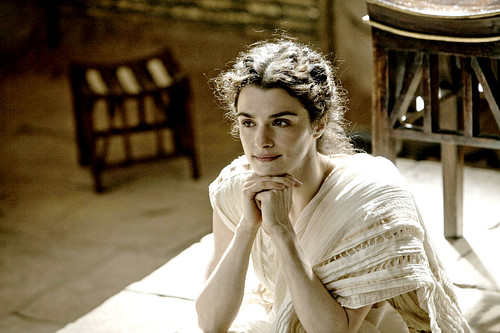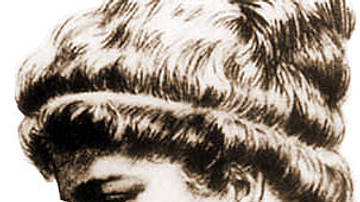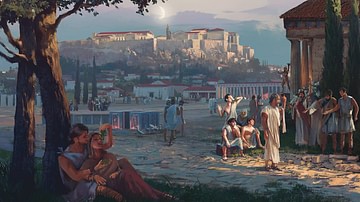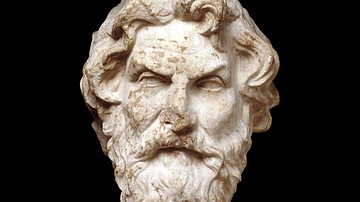In 2009, film director Alejandro Amenabar brought the story of Hypatia of Alexandria (c. 370-415 CE) to the screen through the feature film Agora. Years later, the movie continues to draw criticism from Christian writers for its depiction of early Christians even though these depictions are accurate.
Prior to the film's release, and more so following, Christian writers criticized the movie's historical inaccuracies and its depiction of Christians specifically. On his weblog, one John Sanidopoulos writes, “On May 17, 2009, I wrote a short piece on the soon to be released movie Agora, which I had not seen and still have not seen. Back then I anticipated the film would not treat this sensitive historical period fairly, and from the review below it seems I was correct.”
He then re-prints a review of the film by a Doctor of Theology, Irene A. Artemi of the University of Athens, which justifies his concerns about the film regarding historical accuracy and the depiction of the Christian community. Among her many critiques of the film, Dr. Artemi makes it clear that the film's historical flaws have to do with Amenabar's view of religion: “…it should be noted that the director of the film, Alejandro Amenabar, is an atheist. By his own admission, he was born and raised in a Christian family, then became an agnostic and later an atheist.” Dr. Artemi then critiques the film in light of how Amenabar's atheism influences his depiction of the life and death of Hypatia of Alexandria.
There are, indeed, many historical inaccuracies in the film Agora, as there are in other recent and not-so recent Hollywood movies which treat of historical eras and people, whether Gladiator (2000), or Alexander the Great (1956), Alexander (2004), or even Troy (2004) which tried to bring a `realistic' version of Homer's Iliad to the screen. Each of the writers and directors of these films chose to change details in the actual history of the time for various reasons but, chief among them, simply because the medium is designed to entertain, not educate. One does not go to the movies to learn about ancient history but to be entertained. This same paradigm obtains with Agora and whether the director is an atheist, or a religious adherent is irrelevant. The fact that Dr. Artemi makes a point of his atheism in discrediting the film is significant however in that it points to the real central issue Christian apologists object to in the film: that it paints early Christians in an unflattering light which is undeserved.
Depiction of Early Christians
Agora does contain several historical inaccuracies. Among these are: Hypatia's age (she was closer to 50 or 60 years old), her realization of the heliocentric universe, invention of the astrolabe and hydrometer, and the way she died (the historical records state she was beaten and flayed to death by a mob of Christian monks who then burned her in a church). There is also the insertion of the fictional slave Davus, the wounding of Hypatia's father Theon by the Christians, the fire walking of the monk Ammonius, and other such historical inaccuracies which are added for dramatic effect.
The depiction of the Christian community, however, is accurate for the years in which the film is set. Dr. Artemi, and others, critiques the film's depiction of fundamentalist Christians destroying art and learning in the name of their god but it must be recognized that the way in which early Christians are portrayed is supported by primary sources as well as modern scholarship of the era under consideration. Artemi writes, at one point, “The movie presents the Christians - chiefly the "Bath Fraternity" members - not only as obscurantists, but also ignorant. In one of their conversations among themselves they are shown as saying that the earth and the sky resemble a chest and also as rejecting theories pertaining to astronomy.”
The anti-intellectual stance of the early church is attested to by early Christian writers themselves and so, if the Christians in the film are depicted as ignorant it is because they were so by choice. St. Justin Martyr (c. 100-165 CE) was openly hostile to classical learning and claimed that all the important values and thoughts expressed by writers like Plato were stolen from the Christian Bible's Old Testament. The early Christian apologist Tertullian (c. 160-230 CE) also rejected classical learning and famously stated:
What indeed has Athens to do with Jerusalem? What concord is there between the Academy and the Church? What between heretics and Christians? Our instruction comes from "the porch of Solomon," who had himself taught that "the Lord should be sought in simplicity of heart." Away with all attempts to produce a mottled Christianity of Stoic, Platonic, and dialectic composition! We want no curious disputation after possessing Christ Jesus, no inquisition after enjoying the gospel! With our faith, we desire no further belief.
In these lines, from his `On the Prescription of Heretics', chapter 7, he is referencing Plato's Academy in Athens, the first university in the world, which was closed by the Christian emperor Justinian later in 529 CE (though it managed to remain a seat of learning afterwards). His claim that “with our faith, we desire no further belief” epitomizes the early Christian zeal and helps explain the wholesale rejection of classical learning. Closer to the time period of which Agora treats, the Christian writer St. Gregory of Nazianos (329-390 CE), clearly an intellectual and acquainted with classical Greek literature, still rejects the precepts of learning in favor of faith in the teachings of the church.
Classical Greek and Roman literature was considered part of the `old way' which was now supplanted by the new faith. True Christians, these writers insist, would reject all such learning in favor of Christ's teachings which, as the Bible says, make “all things new again.” Scholar Walter Nigg comments:
The Christian who triumphs and wins prestige is no longer walking in the way of the Gospel. In the eyes of genuine Christianity, all worldly success would be suspect. (15)
In this same way, someone who turned back to regard the writings of the past as valid would be suspect. Just as Lot's wife turned back to look at the ruins of her old home and was turned into a pillar of salt (Genesis 19:26) so would a believer be endangering the soul in reading earlier, non-Christian, writing.
The depiction in Agora of early Christians as `ignorant' in the modern sense of that word is, then, in keeping with the tradition which Christian writers themselves have left us as their legacy. Regarding the charge that the film presents early Christians as `obscurantists' (those who darken or obscure a matter), it is clear that a group of individuals who actively reject the considerable amount of learning available to the literate people of the time would tend to obscure, rather than enlighten, any subject which did not coincide with what they had already decided was true.
An early scene in Agora in which the Christian Ammonius mocks the `dead' statues of the pagan gods while preaching of his `living' god is precisely the argument early Christians used and is similar to the argument St. Paul uses among the Athenians in the Book of Acts 17:16-34. Ammonius is later seen in the film engaging in acts which would be considered `obscurantist' but, to such an individual at that time, there was nothing worth learning in classical literature.
Destruction of Temples
In early Christianity, adherents believed that Christ was going to return any day. There was, therefore, little need for books or intellectual thought as Christ had brought a new paradigm for human beings: faith in a living, present, God who provided completely for believers. When one believes one knows the ultimate truth of existence one is not interested in other's theories and thoughts on the subject.
Christianity was the newfound truth and paganism, and all things pagan, was the enemy of that truth. St. Augustine of Hippo (354-430 CE) who lived roughly about the same time as Hypatia, wrote that pagan temples had to be `redeemed' in the same way as pagan souls and this `redemption' often took the form of sacking the temples, destroying them, and building Christian churches on their foundations.
Even so, as the scholar Helen Saradi-Mendelovici writes, “A systematic destruction of pagan sanctuaries was never the intention of the imperial policy” (49). It would seem, more often, the destruction of pagan sites was the result of the zeal of the Christians in the community and Saradi-Mendelovici continues:
Bishops, especially in the East and in Africa, often used the religious zeal of monks as a means of destroying temples. We also hear of the destruction of pagan shrines by newly converted Christians. The sources present such actions as a manifestation of their adherence to Christianity. (49)
Often, the destruction of pagan sites was simply the result of people in the area carrying away building material from temples and shrines which had been abandoned but the intentional demolition of pagan temples and shrines by Christians has been established as historical fact.

Depiction of St. Cyril
This is also true of the depiction of Cyril in the movie (later Saint Cyril) who plays the role of the `enemy of learning' opposite Hypatia's role as `champion of knowledge and truth'. While Cyril's role in Hypatia's death was never substantiated, it was certainly suggested by ancient writers in the early sources on her murder including the Suda, the writings of Socrates Scholasticus, and The Chronicles of John, Bishop of Nikiu. One modern day critique of the film is that there is no evidence that Cyril believed women were inferior to men and so the film's depiction of him as a misogynist, and the scene in which he reads from I Timothy 2:12, is found objectionable by modern Christians.
Amenabar, however, did not write the passage, “But I suffer not a woman to teach, nor to usurp authority over the man, but to be in silence” – that is found in the Bible and is often read in churches around the world today. Cyril was known as a “pillar of faith” and a champion of the church, which contributed to his sainthood, and his antagonism toward Hypatia and all she stood for would have been completely in keeping with his character as described by ancient writers.
Against this background, Amenabar presents the story of the scholar and teacher Hypatia of Alexandria. The destruction of the library at Alexandria by the Christian zealots as presented in the film has been criticized as inaccurate for many reasons but, chiefly, because it presents Christians in a bad light. The truth, however, is that Christians did, in fact, behave this way in c. 415 CE. That dramatic license was taken with the presentation is not disputed but the historical accuracy of similar scenes enacted throughout the ancient world at that time is certain.
The objections of modern-day Christians to the depiction of ancient Christians in the film are unmerited. Early Christianity had to wipe out pagan thought and practice as a rival belief system and way of life. In fairness, before Constantine legitimized Christianity, pagans attempted to rid themselves of Christians in similar fashion. The early Christians were seen as `troublemakers' who refused to honor the gods of the community and so upset the relationship and harmony between the people and their deities.
Even so, the early persecution of Christians did not result in the same depth of loss as the later persecution of the pagans by the Christians. The loss of ancient knowledge contained in pagan writings aside, the rise of Christianity resulted in a decline in personal hygiene, ignorance of some of the most basic instruments and methods used in medical and dental practice, a decline in the status of women, an abrupt halt to the practice of philosophical inquiry, and the overall neglect of the things of this world, including basic upkeep of cities, in favor of contemplation of the greater, better, world to come.
Conclusion
Whether one believes in the Christian destruction of the library at Alexandria, there is no arguing that early Christianity destroyed an enormous amount of ancient knowledge and crushed intellectual thought. The ancient works we have today (such as Plato, Aristotle, and Plotinus) were preserved by the church because they supported the idea of an ultimate, objective truth. From fragments of other ancient writers and references in extant texts we know there were many other writers' works which did not survive.
As stated earlier, this was not a systematic policy of the early church. There was no official agenda for the destruction of temples or the murder of pagans. Walter Nigg writes:
Tertullian forcefully defended the view that no one must ever be coerced into participating in a religious function, for that would be inconsistent with the nature of faith and `no one would wish to be honored by someone who does not do it gladly'. (209)
By the time of Hypatia, there were Christians who were educated and who did value learning and tolerance but there were many who were not literate, had no wish to be, and felt their faith threatened by those who were. Whether there was an official policy of destruction and murder, then, is almost irrelevant; destruction and murder did take place and did so because of religious zeal and intolerance.
That early Christians should engage in the destruction of the old paradigm should not come as a surprise to modern believers in the faith. To deny those actions of the early church in trying to replace the faith of the past, seen as repellent in today's climate, is as dangerous as trying to deny or gloss over the foolish things one did in one's own youth. Everyone has done things at some point which, later with more maturity and wisdom, one realizes were wrong and even regrets.
As with the individual, so with a faith or with the rise of a country; people make mistakes in their zeal to achieve a desired end. A refusal to admit one's past mistakes is an invitation to repeat them. Today one looks at the 5th century Christians and their destruction of learning and culture in the film Agora and finds their actions deplorable; at the time, though, they were commendable to many, if not the majority, of adherents to the young faith who sought to follow Christ and to make all things new for his second coming.






